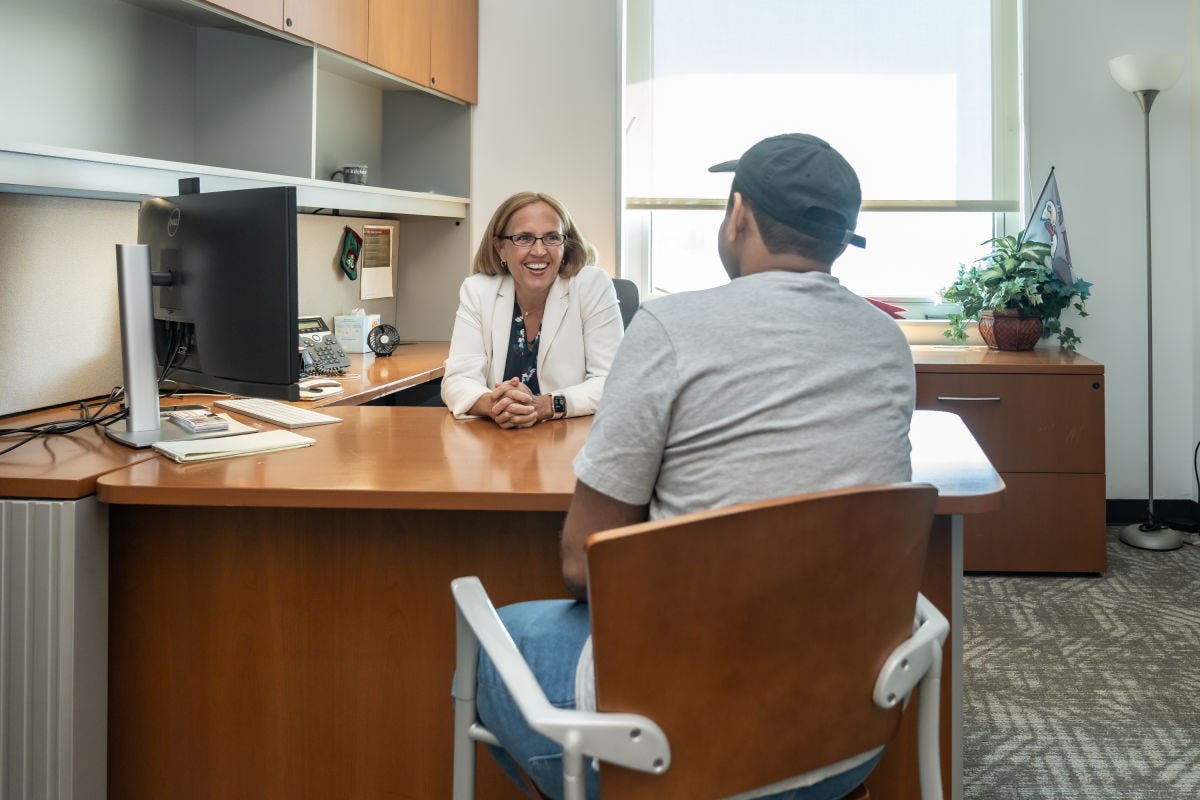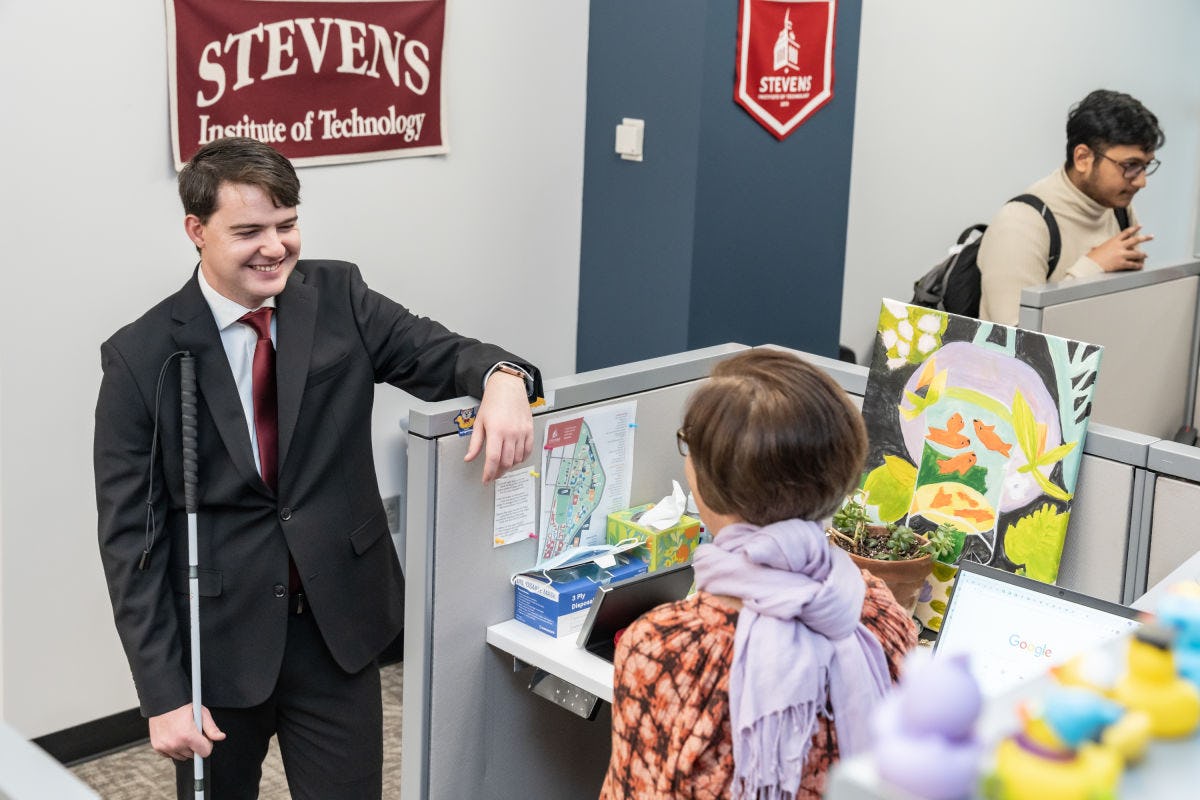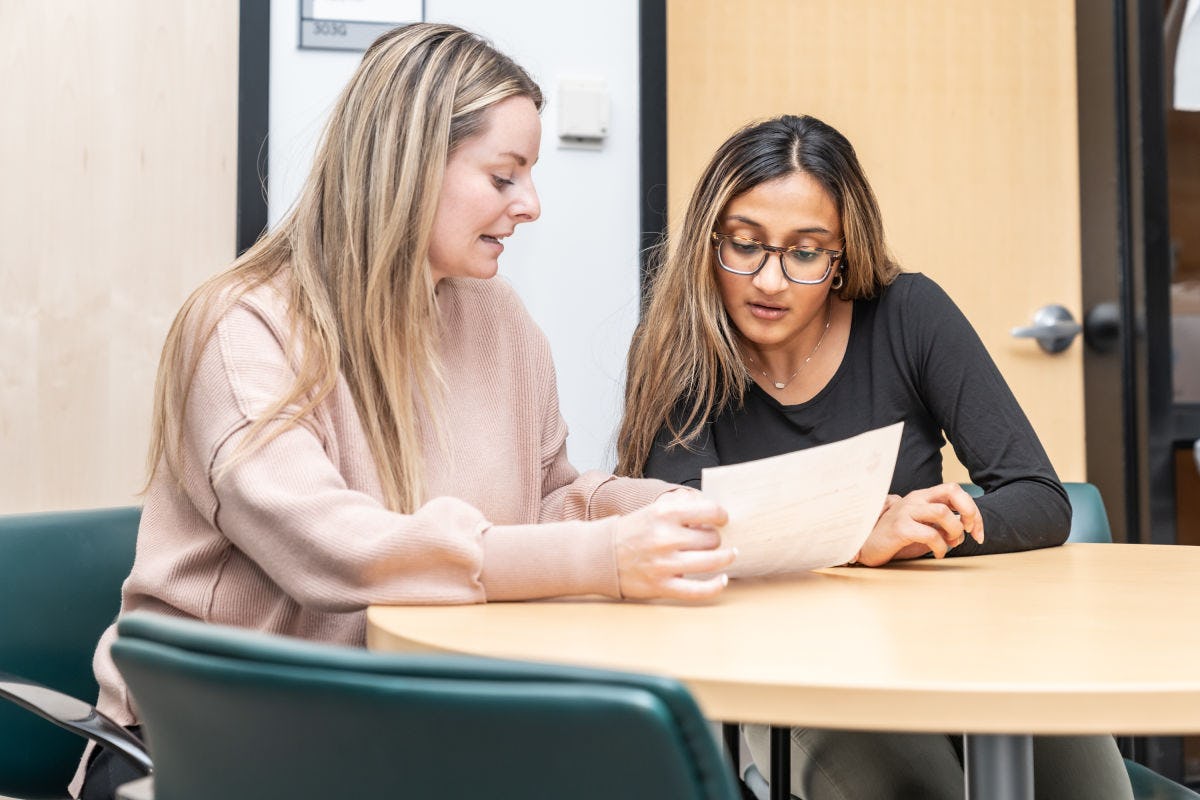The SSB Center for Student Success celebrates 10 years of enhancing the student experience
Success can be defined in many ways, but whether it’s simply providing a place to take a deep breath or ensuring a study plan is on track, the Stevens School of Business Center for Student Success has its students covered.
Unique to the School of Business, the Center offers dedicated academic advising services in addition to each student’s faculty advisor who can concentrate more on career advice and networking instead of the “nitty-gritty” of course selection and degree requirements.
From designing individual study plans and guiding students through the registration process to providing a place to de-stress and help bolster student-faculty connections, it has become one of the most integral parts of the School of Business student experience since its inception 10 years ago.
“We're one-stop shopping, or as we like to call it, ‘home away from home,’ for our students,” said Michelle Crilly, assistant dean of student success. “They really come in for anything. We're their first point of contact, so if we can’t assist them, we send them to the right people. Nine times out of 10, we can solve their issue or make sure that it gets solved.”
Those issues can often literally be the difference between a student completing their degree or having to go home.
“The international students have strict rules about the classes they can take and what they have to do to maintain their educational visa,” said Amy Katzenback, assistant director. “We're always working last minute before they literally get kicked out of the country to fix their schedules and make sure they're following the guidelines as best we can.”
“I had students lined up to see me all day long.”
Michelle has been with the Center since the beginning, serving as program coordinator with then associate dean and current associate professor Ann Murphy. In 2013, the University began a shift towards a more student-centric approach, and after a focus group discussion, the idea for more specialized academic advising came to life.
“We were trying to think of ways that we could be more student-centered,” she explained. “We set up this little academic advising area outside my office, and it was hugely successful. I had students lined up to see me all day long. We decided to launch the center and it’s just grown over the years.”
The Center for Student Success now features its own facility on the third floor of the Babbio Center and four full-time academic advisors who work with students on issues such as academic planning, course registration and scheduling, study abroad opportunities and transfer credits, just to name a few. The staff has roughly 6,000 one-on-one interactions with students each academic year. These engagements have fostered a strong, dedicated team with a shared mission Michelle points out.
“Our team’s strength is being able to connect with students, which is probably one of the reasons we don't have a lot of turnover,” Michelle said. “We’ve all been here a long time. I think we are a good team and we all like to see students succeed.”
“Students love it.”
Just like every other program at Stevens, technology plays an important role. Approximately 40% of the 6,000 visits from students come via the Center’s “Zoom Room.” After being forced to shift to a virtual environment during the pandemic, the staff kept online availability as an option. The link to join remotely is active during business hours and functions just like a visit to the office. A student enters the Zoom meeting where they’re met by the administrative assistant who can direct them to the right advisor to answer their question.
“Students love it,” Michelle said. “If it’s a busy time like registration sometimes there can be a lot of students waiting to talk to somebody. They love the fact that they can say, ‘There’s 50 people in line here. I'm just going to go back to my dorm and jump on Zoom and talk to my advisor that way.’”
“It’s also beneficial for students who have to commute or graduate students who work 9-to-5,” she continued. “We will often do after-hours advising because a lot of graduate students are working and can’t just jump on.”
That flexibility and availability don’t go unnoticed. Robert Dahill, a junior finance major, says a running joke among students is that the staff must sleep in the office.
“You can basically drop in at any time and that’s one of the best things about it,” he said. “Strange things come up and you need a question answered or you’re having difficulty with something. We have faculty advisors and other support systems, but you have to make an appointment or try to go through email, but with the Center, it seems like they're always there.”
“It’s a reason to attend the school.”
For Robert, the Center for Student Success staff was there for him even before he started his first year. As a visually impaired student, he had specific concerns about how he would be able to navigate his courses and work with his professors.
“From the time I was accepted, Michelle and Lisa Cavanaugh (senior academic advisor) reached out,” he said. “They were extraordinarily helpful, making sure that everything was prepared for day one. They lined up meetings with each of my professors to make sure they were aware and ready, and ever since then, whenever I've had some difficulty or needed some clarification, everyone in the Center for Student Success has been right there.”
That proactive support was not unique to Robert. Every incoming School of Business student is introduced to the Center’s staff and resources and provided with a roadmap specific to their program.
“The first day of orientation the Center holds a gathering for all incoming business students,” Robert continued. “They walk you through each program and give you a study plan. I still have my original study plan that they gave me that day. They had all four years laid out perfectly and said, ‘Follow this and you'll be successful, and we'll be here to support you along the way.’ I don't know what I would have done without it.”
“That support is invaluable,” he explains. “I'm always marketing for the business school with my friends. I have two younger siblings who are juniors in high school, and they're starting their college search with all their friends. I'm always talking about the Stevens School of Business and the Center for Student Success, in particular. It’s a reason to attend the school.”
“All my worries were gone because of them.”
The Center’s support doesn’t necessarily end when a student receives their diploma. Serena Shah graduated in 2021 with her bachelor’s degree in business and technology. As a first-year student she originally planned on taking concentrations in management and information systems but the summer before her second year she used the Center’s help to switch to finance.
After graduation, Serena went to work for RBC Capital Markets but company restructuring caused her to rethink her path. She began considering graduate school while exploring other job opportunities and studying for licensing exams. She reached out to Lindsay Hartelius, assistant director of undergraduate outreach and reputation who she had worked with as a student, who then put her in touch with Brian Rothschild, assistant dean of graduate studies who recommended they bring Michelle into the conversation.
“Everyone was working together,” Serena said. “How can we get this girl back into the system? How can she come back and get her master's? I spoke with Amy, Lisa (Burns) and Michelle and told them I was studying for my licensing exams and wasn’t sure if I was going to be a part-time or full-time student based on my job situation. They laid out the plans with me and talked about all the things that you don't consider, and you're not usually told. They were honestly like mother figures. ‘Have no fear. This is what's going to happen.’”
The staff at the Center often joke about putting out fires for students, but in Serena’s case, it turned out to be much more literal. She was in Maui this past August when the wildfires broke out. As if she didn’t have enough on her plate, Serena found out that three of the classes she was registered for in the fall were canceled and her tuition bill was coming due.
“I called Amy and said, ‘Hey, how's it going? I'm in Maui. Can you help me get in contact with everyone? I will take care of the classes when I come back. I'll pay the bill when I come back, but I have no access to anything.’”
Amy quickly went to work, and Serena is currently in her first semester as a full-time student in the finance master’s program.
“With everything that came to the graduate curriculum and what works for me, they were always looking out for me,” she said. “They would make suggestions about a particular certificate or specialization and put me in touch with the right professor. All my worries were gone because of them.”
“I was going for hugs.”
Daniela Cardona, a 2017 quantitative finance graduate, utilized the Center for Student Success for just about every aspect of her Stevens experience. Even before enrolling, she took multiple campus tours during her senior year of high school and would make it a point to speak with Michelle each time to discuss what major she should pursue.
Daniela started as a business and technology major but months into her first year decided that QF was a better option for her.
“I spent many days at the Center, figuring everything out,” she said. “It would be a whole new course load, and she helped me map out my 21-credit semesters. After that, the Center really became almost like therapy for me.”
Her rigorous academic program may have been the most predictable thing Daniela dealt with in her four years in Hoboken. A first-generation student who immigrated to the U.S. from Colombia at a very early age, there were “a lot of hardships.”
“I only became a permanent resident when I was in my junior year so grants and scholarships work differently,” she said. “They helped me look for opportunities with different professors. I would proofread papers, and that would help me pay for books and pay my bills. The Center was just always there for me. I would go there to just sit and do homework, or sometimes I needed to cry because something was really rough at home. I was going for the support through hugs.”
That care and compassion is something that still stays with her today as a global investment banking media vice president at RBC Capital Markets where she manages 20+ junior colleagues.
“I think that is what I carry forth with me on my day-to-day,” she said. “I'm only 29, but I still have to manage difficult conversations and situations at work for every person. I am happy to be the person that people can come to cry to or simply vent because I understand the importance of holding that space as Michelle and Ann did for me. I think I lead with the same compassion that I was shown during my college experience.”





